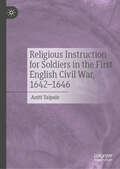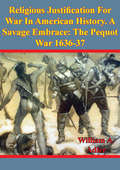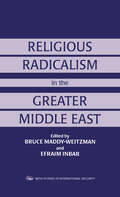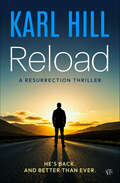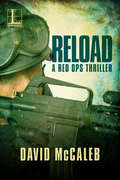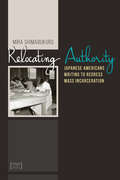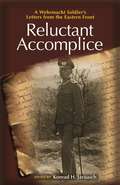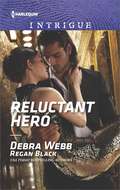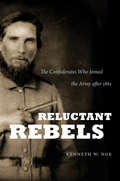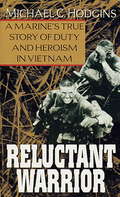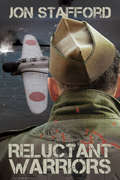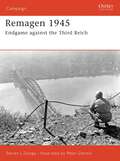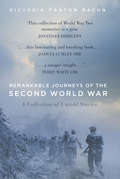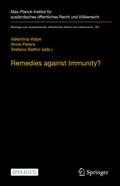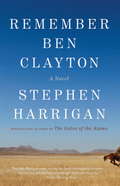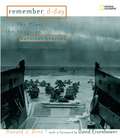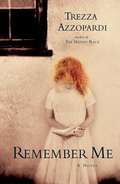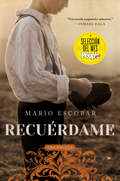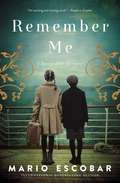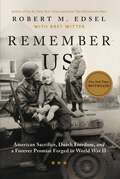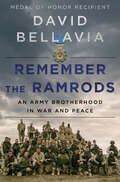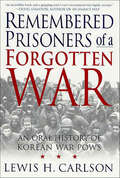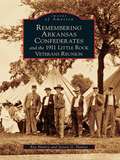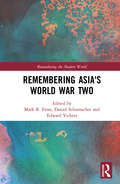- Table View
- List View
Religious Instruction for Soldiers in the First English Civil War, 1642–1646
by Antti TaipaleThis monograph examines religion in the first English Civil War as a tool for war both in instructing soldiers and portraying the enemy. It argues that thus far, the remarkable differences between the teaching of Parliamentarian and Royalist ministers to their respective armies have gone largely unnoticed. Relying on the methodologies of intellectual history combined with a comparative approach, it offers a new interpretation of soldiers&’ religious radicalism and highlights differences between the armies&’ spiritual edification. Hence, it contributes significantly to the history of the Wars of the Three Kingdoms and to the study of political radicalisation leading up to the regicide of Charles I. Moreover, it offers a detailed study of the ways in which religion was used as a tool for war in the early modern period. The role of religion has often been at the centre of historiography of the Wars of the Three Kingdoms (1639-1653). This prominence has culminated in the stereotypical character of a godly Puritan soldier, especially in relation to the New Model Army. However, while there have been debates about the role and importance of religion for the conduct and success of the armies, the theme of soldiers&’ religious instruction as a tool of advice and indoctrination has received less attention. The main aim of this book is thus to rectify this lack in the historiographical mainstream and to set out a new significant interpretation of the religious character of the Civil War.
Religious Justification For War In American History. A Savage Embrace: The Pequot War 1636-37
by William A. AdlerThis thesis examines the ideological justification and conduct of the Pequot War (1636-1637) in Southern New England. It will address as a central issue the role religion played for the English in shaping their response to the challenges of colonization and resistance from indigenous tribes. The first chapter will serve as an introduction to the topic. Chapter's two and three will describe the events prior to and including the conflict in detail. Chapter four will discuss the religious underpinning of Puritan thought and policy. Chapter five will examine the military factors that made the destruction of the Pequot both possible and all but inevitable. Chapter six will conclude the examination and highlight the continued relevance of religion as a shaping force for policy and war.
Religious Radicalism in the Greater Middle East (Cummings Center Series #No. 4)
by Bruce Maddy-Weitzman Efraim InbarThis collection offers a political analysis of religious radicalism in the Greater Middle East - comprising the Middle East, Central Asia and North Africa. The contributors present various conceptual perspectives including international relations, Middle East studies and political sociology.
Reload (The Resurrection Thrillers)
by Karl HillMeet Adam Black: a loner, a fighter, a man bound by honor—and haunted by his past—in this action-packed thriller from the author of The Surgeon. When a long-awaited message sends Adam Black to America, he&’s thrust into a deadly game of betrayal and revenge, uncovering enemies from his time in Afghanistan. Back in Scotland, a seemingly minor act of intervention spirals into a brutal feud with a psychotic heir to a crime empire. From cult compounds to the rugged Scottish hills, Black must rely on his lethal skills to survive. But when the dust settles, can he escape his ghosts—or will they consume him? Black must face his deadliest adversary yet in a brutal showdown that will test his resolve, his strength, and his conscience . . .Relentless action, shocking twists, and a hero you won&’t forget—Adam Black will be your next obsession.
Reload: A Red Ops Thriller (A Red Ops Thriller #2)
by David Mccaleb“David McCaleb has a real winner here. Red Harmon is a guy I’d want on my side.” —Marc Cameron, New York Times bestselling author of Brute Force To save his family—and the free world—Red Harmon is back in the line of fire . . . A sinister enemy is stalking elite military operator Red Harmon and his loved ones. Turning the hunter into his prey, Red uncovers a plot that spans nations and draws him into the remote snow-covered ravines of North Korea. His objective: penetrate the darkest prisons of this mysterious nation to restore national security—and save all he holds dear. Caught in the danger . . . Red’s not the only one who’s been living with secrets. His wife Lori is a lot more than the typical suburban soccer mom she appears to be, and she’s stumbled onto something massive. The future of world peace depends on them—and on an enemy soldier with a powerful personal agenda. If Red’s mission fails, the balance of superpowers may never recover . . .“With effusive writing and strong characters, McCaleb delivers a decades-spanning tale brimming with excitement, intrigue, and deception. Red Harmon is a keeper!” —Alan Jacobson, USA Today bestselling author of The Lost Codex
Relocating Authority: Japanese Americans Writing to Redress Mass Incarceration (Nikkei in the Americas)
by Mira ShimabukuroRelocating Authority examines the ways Japanese Americans have continually used writing to respond to the circumstances of their community’s mass imprisonment during World War II. Using both Nikkei cultural frameworks and community-specific history for methodological inspiration and guidance, Mira Shimabukuro shows how writing was used privately and publicly to individually survive and collectively resist the conditions of incarceration. Examining a wide range of diverse texts and literacy practices such as diary entries, note-taking, manifestos, and multiple drafts of single documents, Relocating Authority draws upon community archives, visual histories, and Asian American history and theory to reveal the ways writing has served as a critical tool for incarcerees and their descendants. Incarcerees not only used writing to redress the “internment” in the moment but also created pieces of text that enabled and inspired further redress long after the camps had closed. Relocating Authority highlights literacy’s enduring potential to participate in social change and assist an imprisoned people in relocating authority away from their captors and back to their community and themselves. It will be of great interest to students and scholars of ethnic and Asian American rhetorics, American studies, and anyone interested in the relationship between literacy and social justice.
Reluctant Accomplice: A Wehrmacht Soldier's Letters from the Eastern Front
by Konrad H. JarauschAn ordinary German soldier’s letters home from Poland and Russia during World War IIReluctant Accomplice is a volume of the wartime letters of Dr. Konrad Jarausch, a German high-school teacher of religion and history who served in a reserve battalion of Hitler's army in Poland and Russia, where he died of typhoid in 1942. He wrote most of these letters to his wife, Elisabeth. His son, acclaimed German historian Konrad H. Jarausch, brings them together here to tell the gripping story of a patriotic soldier of the Third Reich who, through witnessing its atrocities in the East, begins to doubt the war's moral legitimacy. These letters grow increasingly critical, and their vivid descriptions of the mass deaths of Russian POWs are chilling. They reveal the inner conflicts of ordinary Germans who became reluctant accomplices in Hitler's merciless war of annihilation, yet sometimes managed to discover a shared humanity with its suffering victims, a bond that could transcend race, nationalism, and the enmity of war.Reluctant Accomplice is also the powerful story of the son, who for decades refused to come to grips with these letters because he abhorred his father's nationalist politics. Only now, late in his life, is he able to cope with their contents—and he is by no means alone. This book provides rare insight into the so-called children of the war, an entire generation of postwar Germans who grew up resenting their past, but who today must finally face the painful legacy of their parents' complicity in National Socialism.
Reluctant Hero
by Debra Webb Regan BlackThe news they’re after isn’t fake—it’s deadlyFor top security expert Parker Lawton, the anonymous threat is explosive. Return the gold stolen during his intelligence unit’s last Iraq mission—or they’ll each be hunted down. And when one of his men is killed just before meeting investigative reporter Rebecca Wallace, he must take her under his “protection.” But her persistence in getting the real story is even more dangerous—and irresistible.For a dashing war hero, Parker is the most guilty-acting innocent man Becca has ever seen. Still, working with him is the only way to stay ahead of a ruthless enemy. And as her instincts and Parker’s skills hone in on the truth, trusting the desire simmering between them could be their only chance—or the last move they’ll ever make.
Reluctant Rebels: The Confederates Who Joined the Army after 1861
by Kenneth W. NoeAfter the feverish mobilization of secession had faded, why did Southern men join the Confederate army? Kenneth Noe examines the motives and subsequent performance of "later enlisters." He offers a nuanced view of men who have often been cast as less patriotic and less committed to the cause, rekindling the debate over who these later enlistees were, why they joined, and why they stayed and fought. Noe refutes the claim that later enlisters were more likely to desert or perform poorly in battle and reassesses the argument that they were less ideologically savvy than their counterparts who enlisted early in the conflict. He argues that kinship and neighborhood, not conscription, compelled these men to fight: they were determined to protect their families and property and were fueled by resentment over emancipation and pillaging and destruction by Union forces. But their age often combined with their duties to wear them down more quickly than younger men, making them less effective soldiers for a Confederate nation that desperately needed every able-bodied man it could muster. Reluctant Rebels places the stories of individual soldiers in the larger context of the Confederate war effort and follows them from the initial optimism of enlistment through the weariness of battle and defeat.
Reluctant Warrior: A Marine's True Story of Duty and Heroism in Vietnam
by Michael Hodgins"ONE OF THE BEST VIETNAM WAR STORIES I'VE EVER READ, one damn good, compelling read. It's almost something out of a Clancy novel, yet it's true. The best thing I can say about it is I didn't want it to end."--Col. David Hackworth, New York Times bestselling author of About FaceBy the spring of 1970, American troops were ordered to pull out of Vietnam. The Marines of 1st Reconnaissance Battalion, commanded by Lieutenant Colonel "Wild Bill" Drumright, were assigned to cover the withdrawal of 1st Marine Division. The Marines of 1st RECON Bn operated in teams of six or seven men. Heavily armed, the teams fought a multitude of bitter engagements with a numerically superior and increasingly aggressive enemy.Michael C. Hodgins served in Company C, 1st RECON Bn (Rein), as a platoon leader. In powerful, graphic prose, he chronicles his experience as a patrol leader in myriad combat situations--from hasty ambush to emergency extraction to prisoner snatch to combined-arms ambush. . . ."THIS MEMOIR IS GRIPPING."--American WayFrom the Paperback edition.
Reluctant Warriors (Reluctant Warriors Ser. #1)
by Jon StaffordThe soldiers of World War II were ordinary men who found themselves in extraordinary circumstances. Unable to ignore their obligations to their country and to the world, these men bravely faced combat. Many of them never sought reward or accolades, but simply returned from war, forever changed and forever humbled by the tenuous balance of life and death. Each of the men depicted here---Joseph "Chip" Wiley, Jimmy DeValery, Harry Conners, and Theodore Rodgers---had lives, families, and careers they left behind. But they were not the only ones to report for duty: their families also had to fight daily battles through hardships, through defeats, through loss. This book recounts their stories. Men, women, husbands, wives, sisters, brothers, and children: all reluctant warriors, rising to the incredible challenge of wars fought on every front.
Remagen 1945
by Peter Dennis Steven ZalogaFollowing the Battle of the Bulge in the Ardennes, the Allies began steps for the final assault into Germany. The long-delayed US Army thrust over the Roer River, Operation Lumberjack, finally took place in February, placing the US Army along the Rhine. The Rhine represented the last major geographical barrier to the Allied advance into Germany. The plan was for Montgomery's 21st Army Group to leap the Rhine into the Ruhr in a carefully choreographed attack called Operation Plunder. In the event, fortune smiled on the US Army when the 9th Armored unexpectedly found that the Ludendorff bridge at Remagen had not yet been demolished by the Wehrmacht, leaving this one major crossing over the Rhine intact. An armored infantry team supported by the new Pershing tanks stormed the bridge, seized it in fierce fighting and disarmed the charges placed on it. They then held it against numerous counterattacks in which the Germans used conventional tactics and unconventional, including jet bombers, V-2 missiles, and frogmen. Remagen was not the only impromptu Rhine crossing made by the US Army in central Germany but it was the most dramatic and hardest fought. The irrepressible George Patton, in spite of instructions to stay put, snuck an infantry division across the Rhine in the south, setting the stage for the race into Germany. After reinforcing their two major Rhine crossings, the US Army launched its late-March offensive, encircling Frankfurt, and setting the stage for the defeat of the Wehrmacht in the West. This is a gripping, authoritative account of a crucial battle during the last major set-piece operation of World War II (1939-1945).
Remarkable Journeys of the Second World War: A Collection of Untold Stories
by Victoria Panton BaconThose who lived through the Second World War have many stories of bravery, sadness, horror, doubt and longing. Inspired by conversations with a wide range of veterans following the publication of her grandfather’s wartime memoir, Victoria Panton Bacon has gathered a moving collection of their experiences. Their recollections tell of a different time and reveal the courage, actions and sentiments of those whose wartime experiences changed the course of history; stories of ordinary people who lived under the long shadows cast by the war and whose young lives were changed irrevocably. Though many tales are sad, describing being sent into war and the loss of friends and family, there are also stories of joy and love found in the darkest of times. For them, war, the ultimate leveller, threw them into remarkable times, whether they were a merchant seaman, army officer, pilot, young Jewish girl, code breaker or Home Guard recruit. From one extraordinary story to the next, Remarkable Journeys of the Second World War immerses the reader in the lives of real people who lived through conflict.
Remedies against Immunity?: Reconciling International and Domestic Law after the Italian Constitutional Court’s Sentenza 238/2014 (Beiträge zum ausländischen öffentlichen Recht und Völkerrecht #297)
by Anne Peters Stefano Battini Valentina VolpeThe open access book examines the consequences of the Italian Constitutional Court’s Judgment 238/2014 which denied the German Republic’s immunity from civil jurisdiction over claims to reparations for Nazi crimes committed during World War II. This landmark decision created a range of currently unresolved legal problems and controversies which continue to burden the political and diplomatic relationship between Germany and Italy. The judgment has wide repercussions for core concepts of international law and for the relationship between different legal orders. The book’s three interlinked legal themes are state immunity, reparation for serious human rights violations and war crimes (including historical ones), and the interaction between international and domestic institutions, notably courts. Besides a meticulous legal analysis of these themes from the perspectives of international law, European law, and domestic law, the book contributes to the civic debate on the issue of war crimes and reparation for the victims of armed conflict. It proposes concrete legal and political solutions to the parties involved for overcoming the present paralysis with a view to a sustainable interstate conflict solution and helps judges directly involved in the pending post-Sentenza reparation cases. After an Introduction (Part I), Part II, Immunity, investigates core international law concepts such as those of pre/post-judgment immunity and international state responsibility. Part III, Remedies, examines the tension between state immunity and the right to remedy and suggests original schemes for solving the conundrum under international law. Part IV adds European Perspectives by showcasing relevant regional examples of legal cooperation and judicial dialogue. Part V, Courts, addresses questions on the role of judges in the areas of immunity and human rights at both the national and international level. Part VI, Negotiations, suggests concrete ways out of the impasse with a forward-looking aspiration. In Part VII, The Past and Future of Remedies, a sitting judge in the Court that decided Sentenza 238/2014 adds some critical reflections on the Judgment. Joseph H. H. Weiler’s Dialogical Epilogue concludes the volume by placing the main findings of the book in a wider European and international law perspective.
Remember Ben Clayton
by Stephen HarriganFrom the author of the acclaimed best seller The Gates of the Alamo, a new novel that confirms and enlarges Stephen Harrigan's reputation as a major voice in American fiction.Francis "Gil" Gilheaney is a sculptor of boundless ambition. But bad fortune and his own prideful spirit have driven him from New York into artistic exile in Texas just after World War I. His adult daughter, Maureen, serves as his assistant, although she has artistic ambitions of her own and is beginning to understand how her own career--perhaps even her life--has become hostage to her driven father's "wild pursuit of glory." When Lamar Clayton, an aging, heartbroken rancher, offers Gil a commission to create a memorial statue of his son Ben, who was killed in the war, Gil seizes the opportunity to create what he believes will be his greatest achievement.As work proceeds on the statue, Gil and Maureen come to realize that their new client is a far more complicated man than he appeared to be on first acquaintance, and that Lamar is guarding a secret that haunts his relationship with his son even in death. But Gil is haunted as well: by the fear that his work will be forgotten and by an unconscionable lie whose discovery could cost him his daughter's love. The creation of the statue leads to a chain of dramatic encounters, through which Maureen will test the boundaries of her independence and Gil and Lamar, each in his own painful way, will confront their worth as fathers. Remember Ben Clayton vividly depicts a rich swath of American history, from the days when the Comanches ruled the Southern plains to the final brutal months of World War I. It ranges from outlaw settlements on the Texas frontier to the cafés of Paris, from Indian encampments to artists' ateliers to the forgotten battlefield in France where Ben Clayton died. It shows us the all-consuming labor that a monumental work of sculpture demands and the price it exacts from both artist and patron. And with unforgettable power and compassion it presents a deeply moving story about the bonds between fathers and children, and about the power and purpose of art.From the Hardcover edition.
Remember D-Day: The Plan, the Invasion, Survivor Stories
by Ronald J. DrezRemember D-Day combines compelling narrative, dramatic archival photographs and memorabilia, detailed maps, and a timeline to bring readers the exciting story of one of the world's most daring invasions. This landmark book will provide children with valuable insight into the significance of the invasion and help them understand D-Day in the overall context of the war.
Remember Me
by Trezza AzzopardiThe narrator of this novel, set in an English village, is known by many names. To her father she is Patsy; to her grandfather she is Lillian; to her lover she is Beauty; and later, as a clairvoyant on the stage, she is known as Winifred Foy. Through a long series of losses, abandonments, and betrayals, one identity flows into another. The narrator is an outsider, living among outsiders. Throughout her troubled life she holds onto memories of the people who mattered to her and clings to slivers of hope.
Remember Me \ Recuerdame (Spanish edition): El barco que salvó a quinientos ninos republicanos de la Guerra Civil Espanola
by Mario EscobarUna novela emocionante, tremendamente humana e inspirada en hechos reales, que describe las peripecias de un grupo de niños en un plena Guerra Civil Española y su viaje a México, donde recibieron la ayuda del presidente General Cárdenas del Río.Marco, Isabel y Ana viven en Madrid, corre el año 1937 y a pesar de la llegada de la primavera, la ciudad sufre continuos bombardeos y está a punto de rendirse ante las tropas del general Franco. Los padres de los niños se debaten entre la duda de sacar a sus hijos de la ciudad o mantener a la familia unida. Francisco, el padre, se entera de que el presidente Manuel Azaña está organizando la evacuación de casi medio millar de niños con la colaboración del Comité Iberoamericano de ayuda a los niños del Pueblo Español y piensa en enviarlos lejos. En el camino vivirán la aventura de sus vidas y se enfrentarán al peligro de la guerra y la dura separación de sus padres, con los que se comprometen a no olvidarlos jamás.Un viaje a través de la historia del siglo XX de la mano de unos personajes inolvidables que descubrirán el poder del amor, la amistad y que, a veces, lo difícil no es huir sino volver a casa.
Remember Me: A Spanish Civil War Novel
by Mario EscobarAmid the shadows of war, one family faces an impossible choice that will change their lives forever. Madrid, 1934. Though the Spanish Civil War has not yet begun, the streets of Madrid have become dangerous for thirteen-year-old Marco Alcalde and his younger sisters, Isabel and Ana. When Marco&’s parents align themselves against General Franco and his fascist regime, they have no inkling that their ideals will endanger them and everyone they love—nor do they predict the violence that is to come.When the Mexican government promises protection to the imperiled children of Spain, the Alcaldes do what they believe is best: send their children, unaccompanied, across the ocean to the city of Morelia—a place they&’ve never seen or imagined. Marco promises to look after his sisters in Mexico until their family can be reunited in Spain, but what ensues is a harrowing journey and a series of heartbreaking events. As the growing children work to care for themselves and each other, they feel their sense of home, family, and identity slipping further and further away. And as their memories of Spain fade and the news from abroad grows more grim, they begin to wonder if they will ever see their parents again or the glittering streets of the home they once loved.Based upon the true stories of the Children of Morelia, Mario Escobar&’s Remember Me—now available for the first time in English—explores the agony of war and paints a poignant portrait of one family&’s sacrificial love and endurance.
Remember Us: American Sacrifice, Dutch Freedom, and A Forever Promise Forged in World War II
by Robert M. Edsel<b>NEW YORK TIMES BESTSELLER</b> <P> “An intimate, moving look at the war that extracts deep meaning from the carnage and loss.” – Publishers Weekly <P> What happens when you lose your freedom and the people who eventually get it back for you are no longer alive to thank? Remember Us, by Robert Edsel—#1 New York Times bestselling author of The Monuments Men—begins in the pre-dawn hours of Hitler’s invasion of Western Europe on May 10, 1940, when his forces rolled into the small rural province of Limburg in the Netherlands shattering more than 100 years of peace. Their freedom gone, the Dutch lived through four-and-a-half years of occupation until American forces reached Limburg in September 1944, the last portion of Western Europe liberated by the Allies before their advance on Nazi Germany slammed to a halt. <P> Like The Monuments Men, Remember Us is an ensemble piece that follows twelve main characters over a six-year span, zeroing in on ordinary people including Frieda van Schäik, a teenager who falls in love with an American soldier; Lieutenant Colonel Robert Cole, the first member of the 101st Airborne to receive the Medal of Honor; and Sergeant Jeff Wiggins of the 960th Quartermaster Service Company, who escaped the poverty and racism of Alabama for yet another indignity—digging graves. <P> Drawing on never-before-seen letters, diaries, and other historical records, Edsel shows the painful price of freedom, on the battlefields and inside American homes. In this rich, dramatic, and suspenseful story, he captures both the horrors of war and the transcendent power of gratitude, showing the extraordinary measures the Dutch have taken to thank their liberators. Remember Us is exactly the book we need—a reminder that grief is universal, that humanity knows no national or racial boundaries, and that we all want to be remembered, somehow, someway, by somebody.
Remember the Ramrods: An Army Brotherhood in War and Peace
by David BellaviaThe Iraq War’s only living Medal of Honor recipient reveals the untold story of the remarkable brotherhood behind one of the Iraq War’s legendary acts of valor In 2004, he stormed an enemy stronghold to save his platoon. Fourteen years later, his unit reunited and saved him. This is their story.“Acting on instinct to save the members of his platoon from an imminent threat, Staff Sergeant Bellavia ultimately cleared an entire enemy-filled house.” So reads the Medal of Honor citation describing one of the Iraq War’s most celebrated acts of heroism. But the full story of the brotherhood at the heart of these events is untold—and far more remarkable.In 2004, David Bellavia’s U.S. Army unit, an infantry battalion known as the Ramrods—2nd Battalion, 2nd Infantry Regiment, 1st Infantry Division—fought and helped win the Battle of Fallujah, the bloodiest episode of the Iraq War. On November 10, 2004, Bellavia single-handedly cleared a fortified enemy position that had pinned down a squad from his platoon. Fourteen years later, Bellavia got a call from the president of the United States: he had been awarded a Medal of Honor for his actions in Fallujah and would receive America’s highest award for bravery in combat during a ceremony at the White House.The news was not welcome. Bellavia had put the war behind him, created a quiet life for himself in rural western New York, and lost touch with most of his fellow Ramrods, who were once like brothers to him. The first time they gathered as a unit after the war was at Bellavia’s medal ceremony, six days in Washington, D.C., that may have saved them all. As they revisited what they had seen and done in battle and revealed to one another their journeys back into civilian life, they discovered that the bonds had not been broken by time. A decoration for one became a healing event for all.This book—beginning in brutal war and ending with this momentous, transformative reunion—covers the journey of Bellavia’s platoon through fifteen years. A quintessential and timeless American tale, it is the story of how forty battle-hardened soldiers became ordinary citizens again; what they did during that time, and how November 10, 2004, rattled within them; and how their reunion brought them home at last.
Remembered Prisoners of a Forgotten War: An Oral History of Korean War POWs
by Lewis H. CarlsonRemembered Prisoners of a Forgotten War presents a devastating oral history of Korean War POWs.The Korean War POW remains the most maligned victim of all American wars. For nearly half a century, the media, general public, and even scholars have described hundreds of these prisoners as "brainwashed" victims who uncharacteristically caved in to their Communist captors or, even worse, as turncoats who betrayed their fellow soldiers. In either case, these boys apparently lacked the "right stuff" required of our brave sons.Here, at long last, is a chance to hear the true story of these courageous men in their own words-- a story that, until now, has gone largely untold. Dr. Carlson debunks many of the popular myths of Korean War POWs in this devastating oral history that's as compelling and moving as it is informative. From the Tiger Death March to the paranoia here at home, Korean POWs suffered injustices on a scale few can comprehend. More than 40 percent of the 7,140 Americans taken prisoner died in captivity, and as haunting tales of the survivors unfold, it becomes clear that the goal of these men was simply to survive under the most terrible conditions.Each survivor's story is a unique and personal experience, from missionary teacher Larry Zeller's imprisonment in the death cells of P'yongyang and his first encounter with the infamous killer known as The Tiger, to Rubin Townsend's daring escape from a death march by jumping off a bridge in a blinding snowstorm. From capture to forced marches, isolation, permanent camps, and torture, Remembered Prisoners of a Forgotten War is one of the most fascinating and disturbing books on the Korean War in years-- and a brutally honest account of the Korean POW experience, in the survivors' own words.
Remembering 1916
by Richard S. Grayson Grayson, Richard S. and McGarry, Fearghal Fearghal McgarryThe year 1916 witnessed two events that would profoundly shape both politics and commemoration in Ireland over the course of the following century. Although the Easter Rising and the Battle of the Somme were important historical events in their own right, their significance also lay in how they came to be understood as iconic moments in the emergence of Northern Ireland and the Irish Republic. Adopting an interdisciplinary approach drawing on history, politics, anthropology and cultural studies, this volume explores how the memory of these two foundational events has been constructed, mythologised and revised over the course of the past century. The aim is not merely to understand how the Rising and the Somme came to exert a central place in how the past is viewed in Ireland, but to explore wider questions about the relationship between history, commemoration and memory.
Remembering Arkansas Confederates and the 1911 Little Rock Veterans Reunion (Images of America)
by Ray Hanley Steven G. HanleyArkansas seceded from the Union in 1861, opening a chapter in the state's history that would change its destiny for decades. An estimated 6,862 Arkansas Confederate soldiers died from battle and disease, while some 1,700 Arkansas men died wearing Union blue. Total casualties, killed and wounded, represented 12 percent of the white men in the state between the ages of 15 and 62. Bloody, hard-fought battles included Pea Ridge, Helena, Little Rock, and the rare Confederate victory in southwest Arkansas at Jenkins' Ferry. Following the war, the event that included the largest parade ever in Arkansas, the 1911 United Confederate Veterans Reunion, is presented in picture and word. The event has largely been neglected by history books. From the monuments and veterans to the loyal reenactors still gathering today, the story of the Civil War in Arkansas is remembered and preserved for coming generations.
Remembering Asia's World War Two (Remembering the Modern World)
by Edward Vickers Mark R. Frost Daniel SchumacherOver the past four decades, East and Southeast Asia have seen a proliferation of heritage sites and remembrance practices which commemorate the region’s bloody conflicts of the period 1931–45. Remembering Asia’s World War Two examines the origins, dynamics, and repercussions of this regional war “memory boom”. The book analyzes the politics of war commemoration in contemporary East and Southeast Asia. Featuring contributions from leading international scholars, the chapters span China, Japan, Malaysia, Hong Kong, and Singapore, covering topics such as the commemoration of the Japanese military’s “comfort women” system, forms of "dark tourism" or commemorative pilgrimages (e.g. veterans’ tours to wartime battlefields), and the establishment and evolution of various war-related heritage sites and museums. Case studies reveal the distinctive trajectories of new and newly discovered forms of remembrance within and across national boundaries. They highlight the growing influence of non-state actors over representations of conflict and occupation, as well as the increasingly interconnected and transnational character of memory-making. Taken together, the studies collected here demonstrate that across much of Asia the public commemoration of the wars of 1931–45 has begun to shift from portraying them as a series of national conflicts with distinctive local meanings to commemorating the conflict as a common pan-Asian, or even global, experience. Focusing on non-textual vehicles for public commemoration and considering both the local and international dimensions of war commemoration within, Remembering Asia’s World War Two will be a crucial reference for students and scholars of History, Memory Studies, and Heritage Studies, as well as all those interested in the history, politics, and culture of contemporary Asia.
